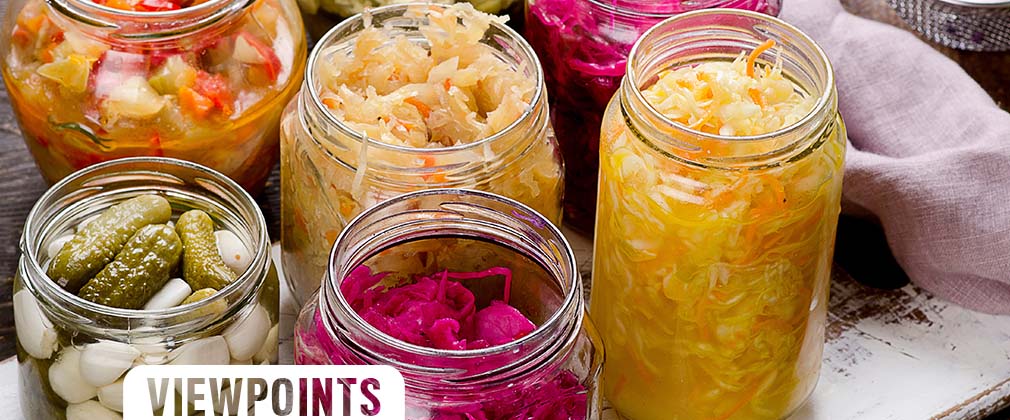Food Trends for 2022 Focus on Gut Health, Mushrooms, and Kelp
BALTIMORE—Jan. 20, 2022. As the new year begins, food trends can provide insight into consumer values, preferences, and purchasing decisions. A recent article in The New York Times suggests that popular dishes, sustainability, and supply chains are driving current trends. Additionally, the pandemic continues to influence how individuals purchase and consume food
According to the 2021 IFIC Survey, 42 percent of consumers currently believe their food choices significantly or moderately affect the environment, and they rank the environment as a major factor in their food purchasing decisions. Sustainability consciousness varies among the generations, with 54 percent of Baby Boomers taking environmental sustainability into consideration when making food choices, compared to 58 percent of Millennials and 45 percent of Gen X. Interestingly, the percentage of respondents who attached value to sustainability when purchasing food in 2021 decreased slightly since 2020.
Plant-based diets, including vegan and vegetarian, have become increasingly common over the past decade. A diet that focuses on limiting meat-based products and emphasizes sustainable food choices is known as “reduceatarianism,” a term coined in 2017 by Brian Kateman. In this trend, which emphasizes reducing instead of eliminating meat products from the diet, we see increasing popularity. According to the 2021 Food and Health Survey, published by the International Food Information Council, 48 percent of those without children under the age of 18 rate meat and poultry as a Top Three environmental impactor, as opposed to bottled beverages, seafood, and canned goods, among other categories. The American multinational supermarket chain, Whole Foods, has also commented on the rise of reduceatarianism in their Top 10 Food Trends for 2022, in which a Trends Council composed of local foragers, regional and global buyers, and culinary experts predicted that the less-meat trend will gain even more traction this year. For many “plant curious eaters,” reduceatariansim is a more attainable option due to its less strict nature, compared to vegetarianism or veganism, while still building toward a more sustainable food system. Meatless Monday is a great start for those interested in eating less meat. One day a week is simple and achievable, and can lead to reduced meat consumption on other days of the week too.
Kelp is a growing food trend aimed at consumers looking for healthy and sustainable products. It has also been called “the new superfood,” given it contains many essential vitamins and minerals, fiber, and omega-3 fatty acids. Unlike foods grown on land, kelp does not require soil or fertilizer. Instead, kelp absorbs nutrients from the water, reducing algal blooms that result from excess nutrients, in the form of fertilizer, running off of farms . Kelp can also sequester carbon dioxide from the atmosphere, which benefits ecosystems. With growing concerns about the environment and animal welfare, macroalgae such as kelp is widely used to develop plant-based substitutes for meat and animal products. Kelp snack products include dried seaweed and kelp pickles. It is also used in salsas, sauces, and seasonings.
Food forecasters also highlight mushrooms as the ingredient of the year for 2022. As a moderate protein source, providing 3.3 grams of protein per 100 grams of product, the demand for mushrooms and the global mushroom market is projected to grow at a compound annual growth rate of 9.5 percent from 2021 to 2028. We’re seeing an upward trend in mushroom consumption because mushrooms are associated with three hot topics: plant-based eating, immune health, and sustainability. They also appear in many alternative meat products and beverages and their unique unami flavor may help reduce salt intake by 30 to 40 percent among consumers.
Another rising trend is the growing interest in gut health. According to the 2021 IFIC Survey, consumers are increasingly interested in using probiotics and prebiotics to support a healthy gut microbiome. Probiotics, or beneficial bacteria, are found in fermented foods such as yogurt, sauerkraut, kimchi, and pickles, and are considered good for the gut. Prebiotics are not bacteria, but rather, compounds that provide nourishment in the gut for probiotics, found in foods such as garlic, onions, asparagus, and leeks. Having a healthy gut is thought to aid in digestion, reduce inflammation, and support the immune system. While supplements can be an easy way to consume probiotics, they are often expensive and vary in type and quality. Fermented foods, including yogurt and kimchi, contain other beneficial nutrients such as vitamins, minerals, protein and fiber. The pandemic has increased consumer interest in fermented foods, given the potential benefits to the immune system. And with the constraints of the pandemic, more consumers have become interested in fermenting foods at home, such as kombucha, pickles, and yogurt.
Among the many changes observed in the food system as a result of Covid-19, online grocery shopping is a trend that has significantly changed food retail in the United States. Once a rather uncommon method of procuring goods, online grocery shopping has surged in popularity since the start of the pandemic, with 42 percent of consumers saying they now grocery shop online at least once monthly, according to the 2021 Food and Health Survey. Furthermore, 20 percent of survey respondents indicate that they shop online at least weekly, which is up from 13 percent reported in 2019, at the start of the pandemic. Procuring food online has many advantages, some of which may explain the uptick in usage in the times of Covid-19, such as allowing consumers to maintain distance from others by eliminating a trip to the store. While it is true that online grocery shopping rates may change as the conditions of the pandemic change, for now, it appears to be a growing trend among American consumers.
